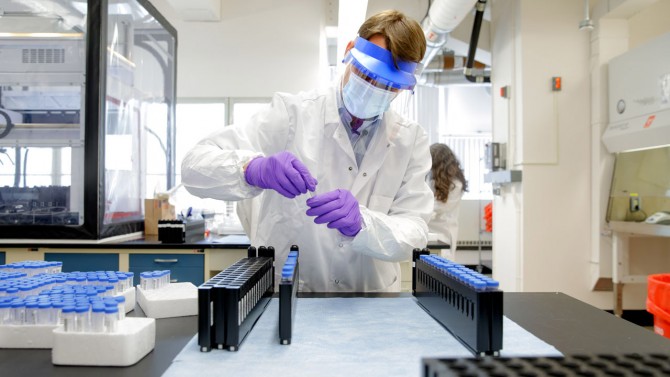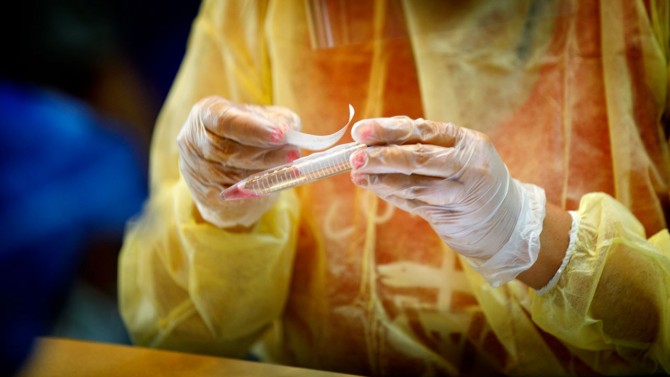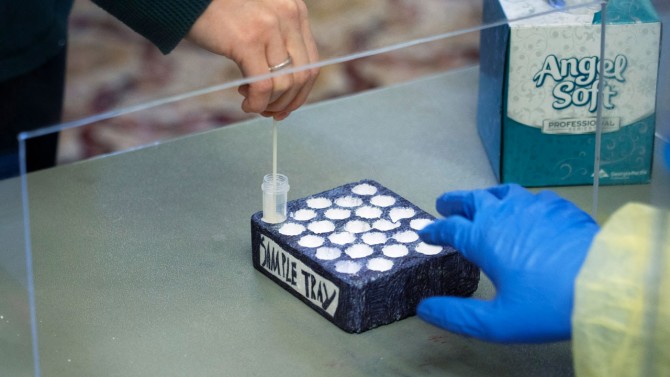While many factors have led to Cornell's success to date in managing the spread of COVID-19 on campus, one unsung aspect has been the university's commitment to analyze and learn, to pivot and adapt. Senior-level committees - working in close collaboration with the Tompkins County Health Department and Cayuga Medical Center - have met steadily throughout the pandemic to assess Cornell's COVID-19 plan, and have suggested improvements that have shaped Cornell's processes. The university will continue to evaluate and modify its approach as needed with agility through the spring semester.
Samples are tested in the fall at the Cornell COVID-19 Testing Lab.
Though hope shines as vaccinations begin to roll out, it will likely take months before the majority of Cornell's population is eligible to be vaccinated. In addition, COVID-19 infection rates have soared both locally and globally, and a new, more transmissible variant of the virus has been detected in Tompkins County, which requires everyone to remain vigilant to avoid infection. These new risks will inevitably require enhanced public health measures for the spring semester.
"The success we had in the fall was - in large part - because we weren't static," said Gary Koretzky, vice provost for academic integration. "While many of the messages are the same this semester - wear a mask, maintain your distance from others, avoid crowds - it is important to recognize that we're in a very different place, facing more aggressive, widespread COVID-19 infection rates coupled with the fatigue that comes from a prolonged public health crisis. There are things we will be doing differently in the spring because of this new reality."
Planned spring semester enhancements to Cornell's policies and protocols are aimed to further support students, staff and faculty, and to make testing even more effective in limiting the virus's spread. The tweaks have been informed by computer models - developed by Peter Frazier, associate professor in the School of Operations Research and Information Engineering in the College of Engineering, and his team - which the university used to build its testing strategy. The updated models account for new, more contagious virus strains and increased local prevalence of COVID-19.
Even faster testing
During the Fall semester, the Cornell COVID-19 Testing Lab (CCTL), based at the College of Veterinary Medicine (CVM), was able to process the great majority of samples within 24 hours of the sample being taken, and that speed was a significant factor in Cornell's ability to control infection.
A key objective for the spring is to process samples even faster, so that in the case of a positive test, Tompkins County Health Department (TCHD) is more quickly able to notify and isolate infected individuals and begin to identify their contacts. Starting this semester, CCTL will process nearly 80% of the samples within 12 to 18 hours after collection.
"With the increased circulation of the virus in the surrounding communities, it becomes even more important to even more quickly identify positive individuals as the number of positives within our community may also likely increase," said Dr. Diego Diel, CCTL director and associate professor in CVM's Department of Population Medicine and Diagnostic Sciences.
To accomplish this faster turn-around time, Cornell testing sites are offering more early morning appointments. Cornell community members are encouraged to have their samples collected earlier in the day, allowing lab personnel to complete the testing so that results may in turn be reported earlier, to create a safer environment for everybody, Diel said.
Also, the CCTL has hired six additional staff who will join the 10 existing full-time staff members. Also, new equipment was purchased and added to the lab, so more samples can be processed and tested simultaneously.
Vaccines on the horizon
With regards to the vaccine, some Cornell community members have begun receiving their first dose in accordance with the New York State Department of Health's phased eligibility criteria, though much of the population will likely not be eligible for many months. In addition, Cornell has applied to the state to become a vaccine distributor and has begun steps to build a vaccine delivery clinic on campus, where vaccines could be administered to Cornell community members, once they are eligible and if and when the university's application is approved.
A sample is tagged in the fall at the coronavirus resting site at Fischell Band Center.
In-house vaccine distribution will help ease the burden on Tompkins County Health Department and Cayuga Medical Center partners, said Anne Jones, director of medical services at Cornell Health and COVID public health officer.
"We could see that benefitting the whole community from a public health standpoint," Jones said, noting that even after being vaccinated, people will still need to continue following safety guidelines, including physical distancing, wearing masks and washing hands.
More study is needed to understand whether vaccinated people can still spread the virus to others, so it will be critical for those vaccinated to still participate in Cornell's surveillance testing program.
Added student support
With regard to supporting students, the university will offer more frequent testing. In the fall, in addition to campuswide surveillance testing, one of the pivots the university made was to adopt "adaptive testing," which involves testing everyone in the social circles of people infected with the virus, in addition to those who meet the definition of close contacts. The approach led to identifying cases that would otherwise have been missed.
This spring, some students will be tested three times per week. The added measure, informed by epidemiological modeling, will help curb potential spread in groups where members are likely to come in close contact with one another, such as varsity athletes and those living in fraternities, sororities, co-ops or other community living arrangements.
Also new this semester, all undergraduate, graduate and professional students will take one of their COVID tests on a Friday, Saturday or Sunday, in part to discourage any non-essential travel.
"We saw a lot of our positive cases in the fall linked to students who had left the Ithaca area and brought the virus back with them," said Ryan Lombardi, vice president for student and campus life. "Since we now know that travel is a high-risk activity, we are strengthening the approval process for any non-urgent travel outside of the region."
Cornell will continue the policy of requiring students to formally submit travel plans for pre-approval. Those who do travel will also be required to adhere to strict testing and off-campus quarantine requirement upon their return. The university has assembled a team of staff to more closely review such requests, Lombardi said.
Helping faculty and staff
When fall semester began, human resource services were focused on helping employees transition to remote work, developing guidelines for workers whose jobs required that they continue to report to campus, and supporting those dealing with pandemic-related stress.
"We've highlighted, and added to, our support services for our workforce," said Mary Opperman, vice president and chief human resources officer.
While employee cases remained low for the first few months, by late fall infections made inroads throughout the community. As a result, the university will continue its policies of required surveillance testing for those approved to work on campus: twice-weekly testing for full-time on-campus employees who interact frequently with others; once weekly for other employees who are regularly on-campus; and bi-weekly for those who visit campus occasionally.
All employees - regardless of whether they are approved to work on campus or work remotely - can also receive free, supplemental testing. Supplemental testing can be scheduled through the Daily Check tool.
Along with continued communication about COVID-19 risks and discouraging unnecessary travel for employees, Cornell has instituted a new pandemic response volunteer program. These employee volunteers work with human resources and the Cornell COVID-19 Response Team to identify risks for workplace transmission.
A swab is placed into a vile at the COVID-19 surveillance testing and collection sites in Willard Straight Hall.
If an employee on campus tests positive, a pandemic response volunteer will call and help identify anyone with whom the employee came in contact and who may need to remain out of the workforce and get tested. This work is an added measure to the contact tracing done by Tompkins County and other local county health department staff.
"These efforts help us act quickly to safeguard our workplace and our employees," Opperman said.
Community effort continues
"We would never have had the success that we had in the fall without the cooperation and the collaboration of all members of our community," Koretzky said. "That included personal health measures - wearing masks, practicing physical distancing - but also participating in the testing program, where compliance was close to 100%."
Employees, for example, worked around the clock to build and run a testing program.
"Staff and faculty from across the campus have volunteered to work on so many aspects of our COVID-19 response," Opperman said. "We just don't get to where we've gotten without incredibly resilient, focused and dedicated individuals who are doing the work, day after day," she said. "We are very grateful."
And, once in place, Cornell's plan worked, in large part, because students made a stellar effort, Lombardi said.
"But we also learned a number of things in the fall," he said, "and some of these tweaks are designed to address those."









